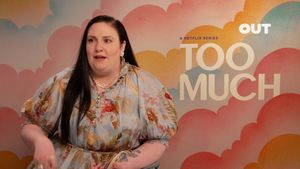Treatment GuideJust DiagnosedSex & DatingAfrican AmericanStigmaAsk the HIV DocPrEP En EspañolNewsVoicesPrint IssueVideoOut 100
CONTACTCAREER OPPORTUNITIESADVERTISE WITH USPRIVACY POLICYPRIVACY PREFERENCESTERMS OF USELEGAL NOTICE
© 2025 Pride Publishing Inc.
All Rights reserved
All Rights reserved
Scroll To Top
By continuing to use our site, you agree to our Privacy Policy and Terms of Use.
In my previous column I wrote about coping with uncertainty by maintaining a sense of optimism when the world seems to be kicking you around. But let's face it, life is what it is. A client who I'll call Sean admitted that he was feeling like his life was in a tailspin: "I'll say it straight out. I don't know how I made it in here today. I'm barely getting out of bed. I can't shake off this feeling that I don't have any hope." How are you doing? Are you rolling with the punches? Or are you finding that those days when things feel almost unbearable are starting to outnumber the good ones? >When things fall apart. Feeling sad at times is part of being human. But people who are depressed have trouble maintaining their normal lives-getting up in the morning, doing work around the house, getting together with friends. Depression causes pain for the person who is depressed, and it also causes pain for the people around them who want to reach out but don't know what to do. >Your life, your meds, your mood. The challenge of HIV and antiretrovirals can affect your mood. On some days you may feel like the challenges are overwhelming. Your medications can also affect your emotions; depression can be a side effect. >How do you know if you are depressed? There are different kinds of depression, which a mental health professional, working with your doctor, can help to diagnose. A diagnosis is based on symptoms that are common among people suffering from depression. Key symptoms include overwhelming sadness, fatigue, loss of interest in things you enjoy, isolating yourself, getting irritable or angry easily, losing or gaining weight, or having difficulty sleeping. >Don't diagnose yourself. Keep in mind that the presence of symptoms does not necessarily mean that you are depressed. Only a professional can make this determination for you. But if you think there is a possibility that you may be depressed, you can take the first step to find out for sure. >When the going gets tough... Go shopping! Shrink shopping, that is. If you feel like the sadness or other symptoms that you are experiencing may be depression, you may want to first talk to your doctor. He or she may be able to help you with depression through medication or by referring you to a mental health professional. You can also find a mental health professional on your own by exploring local resources or going online. Try to find someone who not only understands depression but who also has experience in addressing the special needs of individuals living with HIV. >Build prevention into your routine. Don't isolate yourself at home. Get out and do something you enjoy, even if it's only to take a walk. Get together with your friends and with your family. Eat a balanced diet. Get some exercise and kick-start your good mood hormones. Who knows! You might even want to get a pet. Depression is treatable. Dial or double-click -- but reach out! Don't go through this alone. McClain is a licensed counselor in New York City with a speciality in coping with chronic and life-threatening health conditions. His books include The Complete Idiot's Guide to Breaking Bad Habits and Empowering Your Life With Joy, and he is a frequent contributor to health-related publications. He is also on the board of directors of Miracle House, a nonprofit that serves patients and caregivers who are visiting New York City for HIV or cancer treatment. He welcomes e-mail.
Recommended Stories for You
From our Sponsors
Most Popular
BREAKING NEWS: Trump admin moves to end federal HIV prevention programs
March 18 2025 6:10 PM
Grindr is reminding us why jockstraps are so sexy and iconic
May 02 2025 5:36 PM
Trump's orders prompt CDC to erase HIV resources
January 31 2025 5:29 PM
Celebrating Black History Month with our annual African American issue
February 01 2025 3:28 PM
Tyler TerMeer vows to continue to fight for health care for all
January 28 2025 3:00 PM
Discover the power of Wellness in your life
March 26 2025 12:41 PM
Plus: Featured Video
More Videos
0 seconds of 3 minutes, 18 secondsVolume 0%
Press shift question mark to access a list of keyboard shortcuts
Keyboard Shortcuts
Shortcuts Open/Close/ or ?
Play/PauseSPACE
Increase Volume↑
Decrease Volume↓
Seek Forward→
Seek Backward←
Captions On/Offc
Fullscreen/Exit Fullscreenf
Mute/Unmutem
Decrease Caption Size-
Increase Caption Size+ or =
Seek %0-9
Copied
Live
00:00
03:18
03:18
Latest Stories
The Talk: Starting the conversation
July 25 2025 4:47 PM
BREAKING: Supreme Court rules to save free access to preventive care, including PrEP
June 27 2025 10:32 AM
HRC holds 'die-in' to protest Trump health care cuts
April 28 2025 2:11 PM
Season 4 of The Switch on resilience & radical self-love returns this spring
March 26 2025 12:20 PM
Lexi Love comes out as HIV+ after Trump deletes federal resources
January 23 2025 11:23 AM
A camp for HIV-positive kids is for sale. Here's why its founder is celebrating
January 02 2025 12:21 PM
Thanks to U=U, HIV-positive people can live long, happy, healthy lives
July 25 2025 2:37 PM
“I felt like a butterfly”: Niko Flowers on reclaiming life with HIV
July 23 2025 12:22 PM
1985: the year the AIDS crisis finally broke through the silence
June 26 2025 11:24 AM
Trump admin guts $258 million in funding for HIV vaccine research
June 03 2025 3:47 PM
Two right-wing Supreme Court justices signal they may uphold access to PrEP and more
April 21 2025 4:10 PM
Broadway's best raise over $1 million for LGBTQ+ and HIV causes
April 03 2025 7:15 PM
Jess King is here to help you live your happiest, healthiest life yet
March 24 2025 4:35 PM
Dancer. Healer. Survivor. DéShaun Armbrister is all of the above
July 02 2025 8:23 PM
VIDEO: A man living with HIV discusses his journey to fatherhood
June 10 2025 4:58 PM
500,000 Children at Risk: PEPFAR Funding Crisis
April 08 2025 3:51 PM
The Talk Season 5 premieres this spring with HIV guidance for the newly diagnosed
March 26 2025 1:00 PM
Gerald Garth is keeping people of color happy and healthy through trying times
March 11 2025 3:38 PM
Plus nominated for 2025 GLAAD Media Award
January 22 2025 12:42 PM


















































































